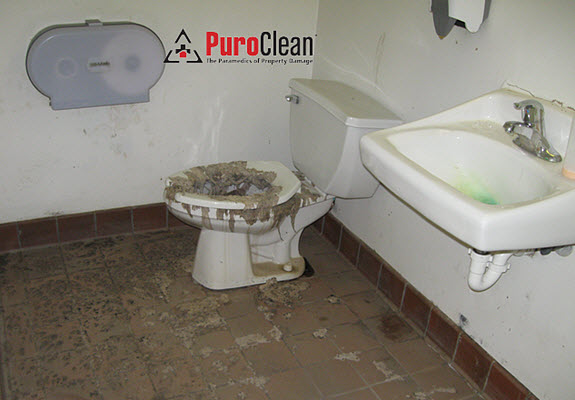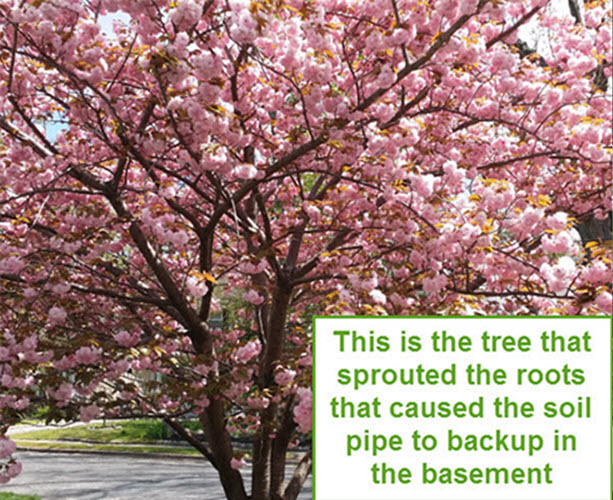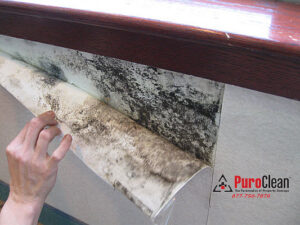[vc_row][vc_column width=”1/2″][vc_column_text]
In many instances, you can prevent sewage backups from happening!

Prevent sewage backups in your commercial building by following our tips

[/vc_column_text][/vc_column][vc_column width=”1/2″][vc_column_text]
In a previous post, we listed the 3 Most common causes for sewage backs ups. They are:
1. Tree root break through of the waste water pipe
2. Structural defects in pipes like sags, cracks, holes, misaligned pipe, offset and open joints, and collapsed pipes
3. Solid and debris build up in the soil line
Previously, we talked about why there are so many sewage backups in our Greater Philadelphia region: the aging infrastructure and the combined sewer systems. And, we gave you a list of tips and tricks if you want to try to clean up a sewage backup yourself.
But whether you have a combined sewer system or a separate sewer system, the steps you need to take to prevent sewage backups to your home or commercial building are pretty much the same.
First, for the problem of tree roots: keep your waste water pipes clear by flushing the pipes several times a year with root kill crystals available at your local hardware store.
Second, for the problem of structural defects: you’ll need to get a plumber to replace the waste water pipes.[/vc_column_text][/vc_column][/vc_row][vc_row][vc_column][vc_column_text]
For the problem of solids and debris causing sewer line backups, take an active role on a daily basis to prevent sewage backups!
Here’s the deal: The list of things you should NOT flush has grown over the years.
For example, remember when we used to flush expired or unused medications?
Yeah, stop doing that.
Not only does it contribute to clogged pipes, it contaminates the water supply.
It seems that waste treatment plants can’t get this stuff out of the water, which means we now have medicated aquatic life and medication-laden drinking water.
So, what should you do with them?
Simply take your unused medications and crush them in a resealable plastic bag.
Then, add kitty litter, sawdust, or coffee to them. This step discourages animals from eating them accidentally.
Reseal the bag and toss it in the garbage.
Voila!
You’ve just prevented a sewage clog, helped the environment, and protected the drinking water supply.
If this seems a little to difficult, or you have a lot of medications to clear from the home, many pharmacies will dispose of unused medications for you.
Just so you know, the U.S. Drug Enforcement Administration will hold their annual nationwide take-back day on Saturday, October 22nd. As the date nears, their website will list participating police stations across the U.S., making it easy to deliver your unused, expired medications to the proper officials.
Another change: Don’t flush facial tissue
Yeah, I know.
It looks like toilet paper. Sometimes, it even feels like toilet paper.
However, toilet paper is made mainly from wood pulp so it breaks down easily in water.
Facial tissue is manufactured to be tough. It contains both wood pulp and additives. And some of the additives are “wet-strength agents.”
What that means to you is that facial tissue won’t break down as easily as TP.
It can sit in the waste pipe and start a real clog.
However, most sewage clogs are created by a combination of human hair and grease. Human hair is unbelievably strong.
Hair, especially when mixed with grease (think moisturizing shampoo and conditioner, soaps, and body wash) is the most common combination of stuff clogging pipes. And, the combination of hair and grease doesn’t readily break down at the wastewater treatment plants either.
So, don’t flush hair down the toilet or bathroom sink.
Here’s a quick drain line backup tip:
If you don’t like using harsh chemicals and if you use a drip coffee pot:
When you clean your machine once a month by running vinegar through it, use the carafe of hot vinegar you collect afterwards and pour it down the bathroom sink drain. Doing this will help dissolve the build up in the drain line from soap, shampoo, hair rinse and body scrubs. If you don’t have a drip coffee maker, just heat vinegar and water on the stove and pour it down the drain.
Remember, toilets have a specific purpose. They are designed to handle water, human waste, and toilet paper. They aren’t trash cans.
Prevent sewage backups by refusing to flush things like:
- disposable diapers
- tampons
- cotton balls and swabs
- mini or maxi pads
- medications
- condoms
- cleaning wipes of any kind
- facial tissue
- bandages and bandage wrappings
- fat, oil, or grease
- dirt
- hair
- bones
- paper towels
- kitty litter
- broken glass or dishes
- garbage
- concrete
Yeah, I know it sounds strange. But all of these items and more have been found fouling up the impeller lines at waste water treatment plants.[/vc_column_text][/vc_column][/vc_row][vc_row][vc_column][vc_column_text]
If it’s too late to use these tips to prevent sewage backup, remember you can always rely on the IICRC certified experts at PuroClean Emergency Recovery Services for sewage cleanup services.
For emergency service call 877-750-7876
[/vc_column_text][/vc_column][/vc_row][vc_row][vc_column][vc_column_text]
[/vc_column_text][/vc_column][/vc_row]

